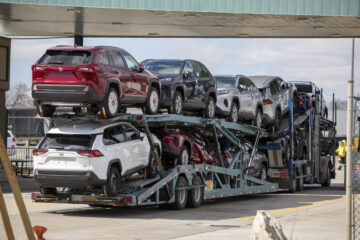With the world of artificial intelligence (AI) moving so quickly, it can be difficult, if not impossible, to assess its impacts properly.
Many people have expressed concern that many jobs will be replaced as chatbots become increasingly sophisticated and companies move toward advancements in robotic technology. Some things that served as the premises of science fiction films no longer seem so far away.
💰💸 Don’t miss the move: SIGN UP for TheStreet’s FREE Daily newsletter 💰💸
However, AI’s impact isn’t the only phenomenon that seems to be giving Americans economic anxiety lately. Given the uncertainty reigning over the U.S. economy right now due to heavy tariffs, many people are highly concerned with prices, specifically when they will go down and by how much.
Mark Cuban, who knows quite a bit about economic forces, recently weighed in on this topic, offering insights into the broader economic impact of AI and answering some pressing questions.
Mark Cuban has some blunt words for those who think AI will be a deflationary force.
Mark Cuban weighs in on a hotly debated AI topic
Anyone who follows Cuban knows he isn’t shy about offering his opinions, even if the topic is controversial. The serial tech entrepreneur is best known for his time as a judge on Shark Tank, a position he left in 2019.
Since then, Cuban has kept busy with new ventures, including his public benefit pharmaceutical provider Cost Plus Drugs. But recently, he’s had plenty to say about the rise of AI and how both investors and consumers should be assessing it.
Related: Mark Cuban has some blunt AI advice for entrepreneurs
On April 2, Anthony Pompliano, Founder & CEO of Professional Capital Management, posted to X that he believed AI will be “one of the strongest deflationary forces we will see in our lifetime,” adding that inflation has been crashing for the past few months.
Cuban responded to Pompliano’s post by stating that he disagrees, predicting that generative AI is poised to become one of the most effective economic growth drivers that the world has seen. As he sees it, these fast-advancing technologies will give way to new products that people will work hard to acquire, even if they did not initially realize they needed them.
Disagree. Generative AI will be the greatest growth and productivity engine, ever. We will see amazing new shit that replaces the old shit, but will cost more and we will bust ass to get it.
Some will be purely digital, but it will be the good digital shit that everyone… https://t.co/NOth2NDF9K
— Mark Cuban (@mcuban) April 2, 2025
This includes self-driving vehicles and highly advanced robots that will do some jobs currently done by humans.
“Anything that needs to be physically transported, human or otherwise, will happen in a self-operating device,” Cuban states, highlighting the new, futuristic nature of the products he believes are coming.
In Cuban’s thesis on AI, though, the strongest companies will be those in the AI native space, referring to firms built to focus solely on AI. The most notable AI-native company is likely OpenAI, but other examples include the AI marketing platform Jasper and image generator Midjourney.
Mark Cuban’s net worth ahead of ‘Shark Tank’ departureTwo AI leaders are pushing for a major tech policy changeMark Cuban has some blunt words on the real impact of tariffs
“There will be two types of companies, Native AI companies that are great at it and those who are on their way out of business,” he claims.
“Deflation happens when we get more of what we already got at a cheaper price. When everything is new, entrepreneurs will charge what the market will bear.”
Cuban debunks an AI market myth
While Pompliano notes that he agrees with Cuban about how AI will develop, he still sees it as a likely deflationary force, arguing that it will ultimately push down the costs of both products and services.
Related: Mark Cuban sends strong message to fired tech workers
Cuban responded with more context for his argument, speculating that AI will continue to change the economy in ways that we likely still can’t fully visualize.
“The beauty of AI is that it will help entrepreneurs create things that don’t exist today. That is where the demand will be. Human-like robots for the home or business aren’t being sold today. Agents that do tasks for us, barely exist. Other things that are new will become ubiquitous.”
In addition, Cuban adds that he doesn’t see any reason to price these AI-powered technologies lower than what they will be replacing, describing them as being “far better” in terms of work quality.
Pompliano isn’t the only one to argue that AI will likely be deflationary, though.
In January 2025, OpenAI CEO Sam Altman made a similar prediction, stating that he believes investors often misunderstand this factor. However, Cubans seem convinced that companies like OpenAI will help usher in an economic era in which the opposite is true.
Related: Veteran fund manager unveils eye-popping S&P 500 forecast


